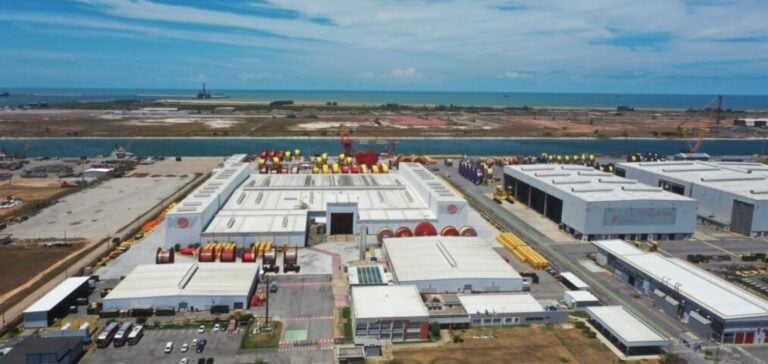Prumo Logística and Fuella have officially launched a low-carbon hydrogen hub at the Port of Açu, in the state of Rio de Janeiro.
This ambitious project covers one million square meters and aims to produce hydrogen from clean energy sources, thus contributing to the decarbonization of the global energy sector.
Thanks to its geographical location, the Port of Açu offers major logistical advantages for exports, particularly to Europe, where demand for decarbonized energies is booming.
The agreement between Prumo and Fuella has been formalized in a Memorandum of Understanding (MoU), which foresees a phased deployment to ensure efficient implementation.
This partnership is part of a global strategy designed to meet today’s energy challenges, while strengthening the competitiveness of companies on the international market.
An industrial alliance for a sustainable energy future
The Port of Antwerp-Bruges, a strategic partner in the project, played a key role in securing the land and facilitating the necessary agreements.
This collaboration strengthens the Port of Açu’s position as a major future energy hub, capable of meeting the growing need for clean hydrogen. The project includes the construction of a 520 MW ammonia production plant, with an annual capacity of 400,000 tonnes of hydrogen.
This production is intended to supply both export markets and the Brazilian domestic market.
The final investment decision is expected within the next four years, with production scheduled to start in 2030.
Technological advances and economic impact
This low-carbon hydrogen project at the Port of Açu marks a significant step towards reducing global carbon emissions.
Hydrogen, produced via electrolysis from renewable resources, is a promising alternative to fossil fuels.
By investing in this infrastructure, Prumo Logística and Fuella are demonstrating their determination to support a global energy transition while consolidating their position in the clean energy market.
The location of the Port of Açu, combined with its robust infrastructure, was a decisive factor for Fuella, which sees this project as an opportunity to expand its international footprint.
This positions Brazil as a key supplier in the low-carbon hydrogen value chain, with positive economic spin-offs for the Rio de Janeiro region, particularly in terms of job creation and industrial development.
Next steps include finalizing technical and environmental studies, as well as extending infrastructure to support hydrogen production and export.
The success of this initiative could inspire other similar projects, reinforcing the adoption of hydrogen as a key energy carrier worldwide.






















